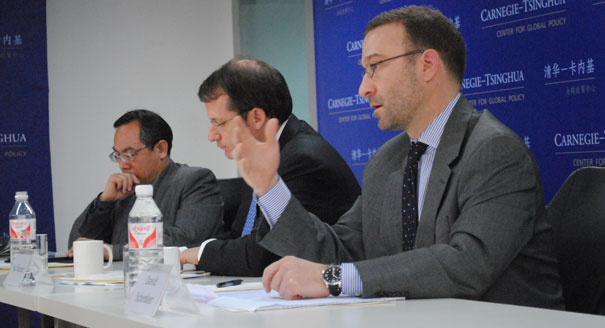Registration
You will receive an email confirming your registration.
IMGXYZ4247IMGZYXThe Arab Spring’s chain of revolutions across North Africa and the Middle East transformed the socio-political landscape of the region. Continued demonstrations and violent clashes between authorities and demonstrators in Libya, Egypt, and Syria highlight the uncertainty in the region’s future. At the same time, the withdrawal of U.S. and NATO troops from the Middle East will leave a vacuum of power that China, as a global leader, could fill.
The Carnegie-Tsinghua Center for Global Policy hosted David Schenker, director of the Program of Arab Politics at the Washington Institute for Near East Policy, at a roundtable discussion to examine the future of the Levant and China’s potential role. The roundtable featured a variety of Chinese experts and scholars on the Middle East. Carnegie-Tsinghua’s Paul Haenle moderated.
Trajectory of Arab Spring
- Libya and Tunisia Post-Revolution: The success of the Tunisian uprising sparked Libya’s demonstrations and clashes, Schenker explained. However, having toppled their leaders, both countries remain divided as secular and religious factions struggle for power, and militias refuse to disarm. Schenker added that tribalism and regional differences have persisted and added to the divisions.
- Proliferation of Weapons: As a result of the revolutions in Tunisia and Libya, Schenker explained, proliferation of arms has increased across North Africa and the Middle East. This unrestricted movement of arms enabled the coup d’état in Mali and weapons have flowed into Egypt, particularly the Sinai. Many of these arms have reached Hamas in Gaza. However, Schenker added that it was difficult to monitor and curtail the movement of these weapons and predict how such wide-spread proliferation will affect the future stability of the region.
- New Consolidation of Power: Schenker stated that the Muslim Brotherhood holds an influential role in the Middle East, particularly in Egypt. This newly empowered government, Schenker explained, pursued an Islamic hardline foreign policy agenda with an aim to consolidate the Brotherhood’s power across the region. As an example, Schenker referenced the revolt against the Assad regime in Syria, which he said originally began as a secular and non-Islamic movement, but subsequently transformed into an Islamic insurgency due to Saudi and Qatari intervention. Wang Suolao, a professor at Peking University, added that the United States aided the Muslim Brotherhood in Egypt, enabling its consolidation of power.
External Involvement in the Middle East
Energy is the primary strategic foundation underpinning interest in the Middle East, Schenker said. A potential interruption of oil flow due to regional conflict and demonstrations could push countries like China to play a more pronounced role in the region.
- Declining U.S. Involvement: Schenker stated that the Obama administration’s focus on domestic affairs and the recent discovery of vast reserves of shale gas and oil in the United States may ultimately contribute to U.S. disengagement from the Middle East. Securing energy interests in the Middle East remains a U.S. priority because the global economy depends on the free flow of oil out of the Persian Gulf, Schenker added, but Washington may expect states more dependent on Middle East energy to contribute more to securing the region in the future. He explained that China’s rising energy requirements may spur Chinese involvement in the Levant to ensure stability.
- Is the United States Accountable?: Xue Qingguo, a scholar at Beijing Foreign Studies University, raised the issue of U.S. intervention in the Middle East and the resulting instability. Schenker responded that the U.S. invasion of Iraq was partially responsible for some of the regional instability. However, he added that the U.S. presence in the Middle East had actually helped open up the region. The toppling of Sadaam Hussein inspired the subsequent demonstrations that became the Arab Spring, Schenker said.
- Room for China: Schenker highlighted concerns from the West over China’s lack of engagement in the Middle East and whether China could fill the security vacuum left in the region if the United States were to reduce its presence there. Ma Xiaolin, founder of Bo Lian She blog, explained that China’s multilateral relations in the Middle East were strong and that an Islamist government in Egypt does not have the same negative consequences for China that it does for the United States. He explained that the differences in Chinese and U.S. foreign policy principles mean that each country faces a different kind of political risk in the Middle East.
Discussants: Wang Suolao, Niu Xinchun, Tang Zhichao, Xue Qingguo, Ma Xiaolin
